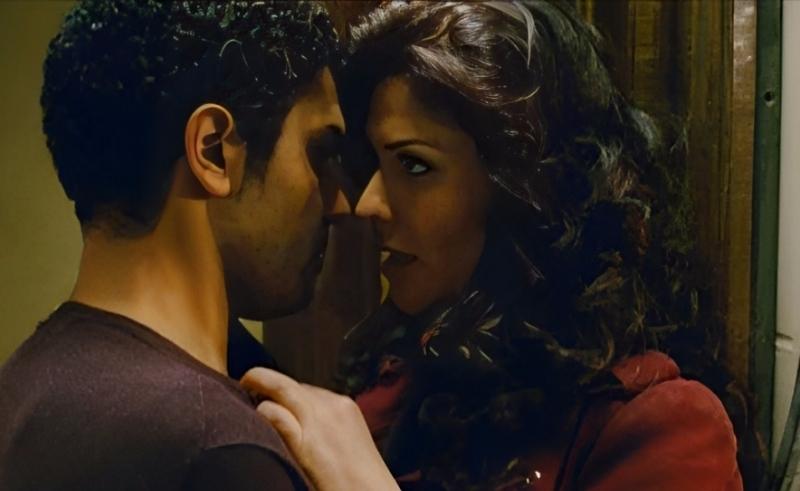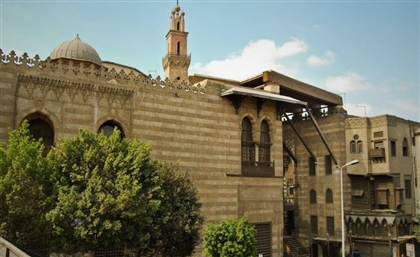The Arab Kissing Archive Reclaims On-Screen Intimacy in Arab Film
The Arab Kissing Archive presents a counter-narrative on Arab film through the lens of its classic pecks and smooches.

Almost every weekend, my family and I gather to watch a film. My mom makes the popcorn and my sister embarks on a quest to find a ‘family-friendly’ film. It’s an ambiguous term that we’ve taken for granted, one that limits our film choices to keep awkward silences from taking over our family evenings. The checklist includes our respective tastes and preferred genres, an absence of intimate moments, and absolutely no physical violence (except not really).
I can think of a couple of films my parents would immediately skip whenever they were aired; for a myriad of reasons, they simply did not fit the family-friendly category. Filmmaker Osama Fawzy’s ‘Baheb El Cima’ hit theatres in 2004, yet I’ve only seen it 15 years later when it was released on Netflix, because it was one of those ‘forbidden’ films in my home. Many scenes were seen through the fingers of concerned parents or only heard because we look away from screens feigning disinterest, and so entire stories are simply erased, shamed, and marginalised.
‘Baheb El Cima’ was a very controversial film on its release, prompting civil lawsuits calling for its ban, and an almost collective social decision to ban films steeped into people’s homes, marking a period overtaken by ‘clean cinema’. The term was first popularised in the late 90s, with producers aiming to essentially increase ticket sales by appealing to a wider audience i.e. the entire family. In other words, films that appeal to a broad demographic of tastes and therefore attempts to dodge an even broader criteria of distastes by being as bland and safe as they can. The term, later on, set a filmmaking trend and became a moral indicator used to this day.
Films are a historical reference, a reflection of a filmmaker’s point of view the second their lens locks in on a frame. Four Arab cinema enthusiasts saw the value of those references and decided to digitally archive them. Throughout their search, what piqued their interest was the intimacy and sensuality, the kissing scenes they believe disappeared from Egyptian cinema in particular since the late 90s. In an effort to bring what was shunned back out of the darkness of censorship, The Arab Kissing Archive was formed.
The Instagram account acts as a digital archive, posting snippets of kissing scenes from films made all over the Arab world, documenting titles, actors and filmmakers in the process. The project began in January 2022, with the anonymous founders amassing a dedicated Instagram following and a feed of Arab cinema’s remarkable pecks and smooches while reclaiming a cinematic narrative that is often forgotten. “All movies had kissing scenes, whether funny or romantic or parental, which is currently rare in Arabic films, especially Egyptian ones,” the founders tell CairoScene. “That made us start researching and archiving this journey online.”
The account created a community curious enough to question the morality ascribed to films and the choices made by filmmakers and viewers alike. However, they also had to deal with cyberbullying - directed both towards them as founders, as well as towards the actresses in the scenes they post. Which, in a sense, reflects part of the reason behind the censorship of kisses, and why they chose to put the spotlight back on them.
“Most of these films we grew up watching on national television, they were all screened in theatres available to the public,” the founders say. “A social shift has happened and now on-screen kisses are controversial, which is kind of sad, yet also interesting to us. Displaying this shift online also instigates a conversation about what should be censored and if censoring art was ever a solution.”
From Egypt’s golden age of films to Tunisian independent films, the Arab Kissing Archive is documenting the scenes people have been used to skipping or cutting with contributions sent by their followers, including the founders’ favourite on-screen kisses in ‘Raw’et El Hob’ (1968) starring Roshdy Abaza and Naglaa Fathy and ‘Nar El Hob’ (1968) starring Souad Hosny and Hassan Youssef.
Recently they have been questioning the inclusion of violent and non-consensual scenes as well. They would usually post content warnings to alert viewers, yet they’ve been met with a dilemma about their moral responsibility as archivists, and whether they should be censoring themselves as well. “We’re not here to judge or discuss what we archive, and we’re against all forms of sexual violence,” the founders explain.
The founders received requests online to remove violent scenes with a claim that archiving and sharing their finds are separate acts, which raises a question about the importance of a kissing archive if it’s inaccessible. It also begs the question if the Arab Kissing Archive is defining kissing and intimacy through its digital archive, or if they just reflect the definition and nature of kissing in Arabic films. According to the founders, it’s an important and nuanced conversation, one that wouldn’t be possible without The Arab Kissing Archive existing in the first place, and the way it brings to light notions of morality, violence, and intimacy through the lens of films.
With more than two hundred films on their page so far, the archived kisses present a counter-narrative on the history of Egyptian cinema and Egyptian society at large, challenging patriarchal and moral hierarchies, while inviting audiences to question the differences between Faten Hamama’s on-screen kisses and today’s emerging Arab actresses.
























